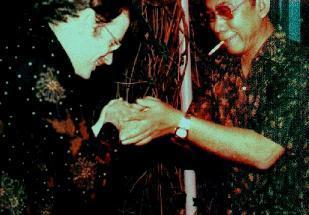 do
not complain much, so I was being as refined as
possible, quietly grousing about another
foreigner's arrogance and rudeness. Suwondo
responded slowly, "Did you tell him you were
angry? That's very important."
do
not complain much, so I was being as refined as
possible, quietly grousing about another
foreigner's arrogance and rudeness. Suwondo
responded slowly, "Did you tell him you were
angry? That's very important."
Back in the States, Joe Errington and I were talking about reverse culture shock: the problems of coming back from Java. "You've got to force yourself to start using your left hand again and pointing and talking louder," he warned, having been through this passage before. I could not imagine letting myself return to being so rude. This transition is a very real problem, and highlights much of what makes the practice so hard in the West as well. In addition, Suwondo's seemingly uncharacteristic and aggressive advice in the library provides an indication of some of the differences between these cultural contexts, and the behavior appropriate in them.
Suwondo's query sounded strange because the Javanese context is basically passive and receptive; it is absolutely vibrant with attention, but is not aggressive. They are the social equivalent of a volcano. There is a lot of dynamic activity going on underneath -- stresses and strains being balanced, some tensions being quietly released and others being stored away -- but nothing is apparent on the surface. Just another quiet mountain scene. But when the Javanese social volcano erupts and spews forth all of these pent up energies and loves and hates and all the injustices felt and witnessed, now that is an awesome and awful spectacle. The last time there was a full eruption was in the 1965 massacre of the communists and Chinese. Some five hundred thousand people were carried away in the lava of Javanese wrath and terror.
What is generally visible is the quiet mountain, but there is a genuine, palpable fear that underlies behavior; the Javanese are rightly afraid of their anger being excited, and they will walk an extra five miles home to avoid getting into a strained position. It comes as no surprise that the culture-bound psychiatric disorder that Java is famous for is amok, a sudden murderous frenzy that the afflicted person turns indiscriminately on everyone in a crowd around him.
Another aspect of this passivity is based on experience. Like other groups that practice open psychology, the Javanese find the operation of Natural Law so plain and apparent that there is no disputing it. They behaviorally assume what might be termed the "conservation of affect", meaning that what is felt is not fleeting but continues and tempers the course of events until the affect is released in justice through Natural Law (Purba Wasesa) and all return to rasa murni, a concept akin to the stern Hellenic goddess Anagkh and Ancient Egypt's quintessential Ma'at (on whose bearing all depend), that indicates strict absence of separation from Reality.
However, we might note here that as in the Greek and Egyptian visions, reality is not a detached, distanced being, but a conscious presence involved in the definition of every moment (neither indifferent to or separated from them). We should recall that Anagkh (my ever so dearly beloved "Grand Marshal"), the Goddess of Reality or Necessity, was rarely worshipped because she just gives it to you the way it is and insists on its being thus. Anagkh is one of the old gods, like the Furies (ErinueV and KhreV) who underpin amok, who know nothing of "contingent reality" except as disgrace and iniquity. As a being she is construed in line with Melissus' comment concerning reality: "Nothing is stronger than dread Anagkh". She is a spirit of grounded, raw reality much like an active, individuated sense of palaiouV nomouV, and also harkens back to our steadfast open absolutes (e.g., Tuhan, Tunggal, and Ingsun) in relation to Purba Wisesa in Javanese mysticism, as well as Tintiya and the whole Dewa Agung being still held open and served over in Bali between busloads of tourists, and Kangdjeng Ratu Pinanditi lawan Dinewi lawan Binatari, Njai Lara Djonggrang, our own beloved Dewi Tjandi, who underwrites rasa murni, our impeccable Reality reference in Sumarah.
We might also inject that in Heraclitus we have a very clear picture of how what comes to be transpires mechanically. EriV, the Lady of Sorrow, Goddess of Confrontation, Strife or Hatred, is what Anagkh, our stated and knowing reality or necessity, has to work with in defining what happens. Without active EriV, without confronting the problem and suffering it down, there can be no justice in that we all, i.e., reality, get tied up in unrecognized beauty and horror, undifferentiated glory and infamy, and are forced to hold the undigested material as such until it can be sorted out (for a more complete contextualization from the Greek side of the Greece/Java, palaiouV nomouV/Purba Wisesa Connection, please see From a Greek Vein or more particularly Justice Depends on Confrontation and all Things Happen by Confrontation and Necessity).
Feelings are pushes or pulls on the fabric of being. They are one of nature's tools for inspiring change and responding to disturbance; the closer you stand to open being, the better you can heed the calls of nature, and thus serve the ones you love. At the same time, the more at one you are with existence, the less vulnerable you are to nature's wrath as you become one with its purposes.
With this quietly anxious waiting to serve, the Javanese bring the hushed awe of standing in a cathedral into their daily lives; they express the respectful deference of being together with, in fact, right in the midst of something mighty and magnificent and loving and terrible. A pulsing sense of being in the presence of Tuhan, and of witnessing the workings of Purba Wasesa. This holds much of the Javanese sense of themselves, as well as being the essence of their spirituality.
In any case, one outgrowth of this is Javanese patience. They are so patient and attentive and slow that their whole culture reflects watching; so methodical that they seem to sweep the floor and paint the wall and walk in slow-motion; so deadly patient that I never heard anyone swear and to my knowledge they do not even have an active swearword in the language (maybe they curse in modernizing Jakarta or hurly-burly Surabaya).
The group I guided had a core of four people. One of the girls was loquacious and could tell some of the longest, dullest stories that ever put a frog to sleep. After I had listened to the same stories various times, I found they did not carry much content beyond a prolonged scream of loneliness, anger and self-pity. They felt like a bad habit well worth breaking; if she could shorten her positions, maybe we could start sharing them with her a bit more. But Suwondo always advised me to be patient and quiet and let her say her piece. This is the language she is written in. Patience, be calm and listen.
Then with this other he advocated confrontation. Why?
Let's skip back to the problem of coming home. First, beyond the predictable culture shock, the practice itself is normally rather pacifying in the early stages. This is when the fourth desire (the cardinal desires -- taking, competing, cooperating and giving -- will be discussed in Chapter 3), mutmainah (giving), first comes out, and the years of suppressed energy in that urge can make you more tranquil than warm milk. Supiah (cooperation), the third desire, also becomes more active. The anger and ambition that previously loomed so large in your vision get shunted for a while. You begin to give; you no longer turn away in anger, harbor wrath or vengeance; you become present and direct, but rather less concerned about competition and survival.
At the same time, a pamong's job, especially at the beginning, is to let being express itself and learn to participate in the expression. Initially this participation is necessarily quite passive. Later this is apt to change as a guide acquires more fluency and tools of communication; however, just as giving dominates at the start in the practice, calm receptivity and acceptance command in guiding.
Eventually the energies of aluamah and amarah (taking and competing), the two temporarily neglected desires, come back again and some sort of balance is worked out, all of which is part of the process termed ngruntutake hawa napsu (conforming to the true nature of the desires). Since the habits of over-focusing have mostly been released by that time, these desires then mark a less self-interested, more spontaneous passage.
However, if the reader does attempt the practice described here (and it certainly is a good time-and-energy "investment option"), he/she must be prepared for what one of the senior guides, Sri Sampoerna,
 warned
me when I was leaving Solo: "When you return to
the West, you will be as if a stranger in a
strange land." You do not really have to leave the
West to become a stranger; you need only pay
attention while those around you do not. Have you
ever been to a party where the liquor flowed free
while you nursed a soft drink? It is akin to that.
This is why Suwondo advocated confrontation: even
in a best-case scenario, Westerners are apt to be
too absorbed to notice when they step on you.
warned
me when I was leaving Solo: "When you return to
the West, you will be as if a stranger in a
strange land." You do not really have to leave the
West to become a stranger; you need only pay
attention while those around you do not. Have you
ever been to a party where the liquor flowed free
while you nursed a soft drink? It is akin to that.
This is why Suwondo advocated confrontation: even
in a best-case scenario, Westerners are apt to be
too absorbed to notice when they step on you.